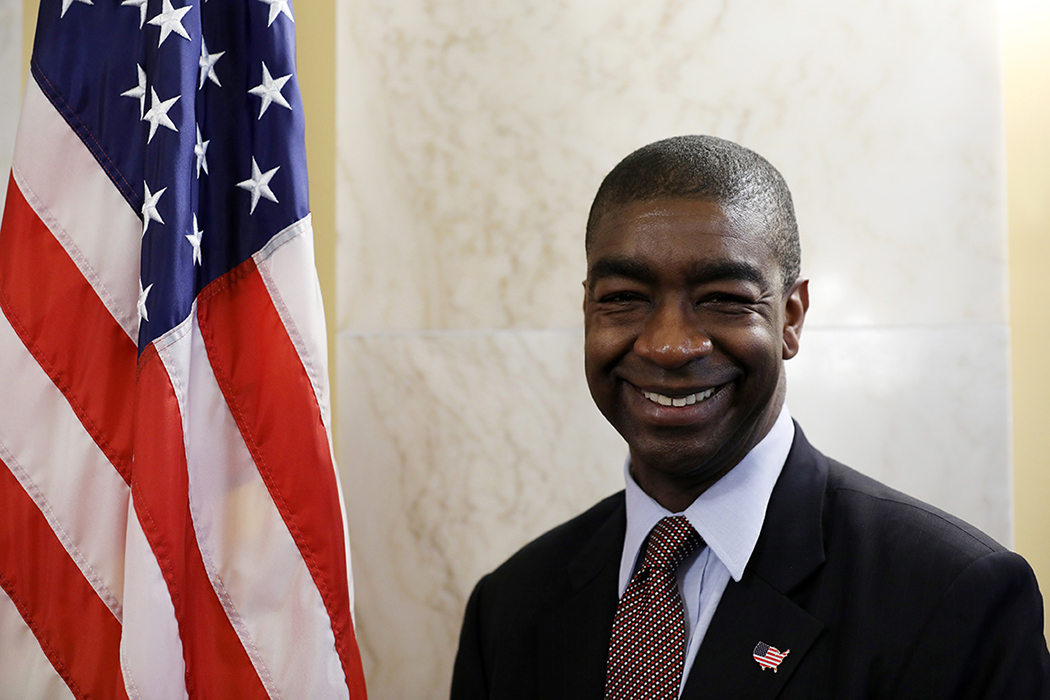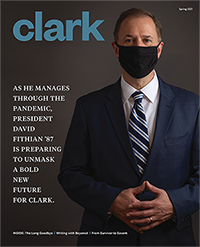Thomas Hicks ’93 says elections are a matter of trust

Thomas Hicks ’93 shared with millions of Americans the shock and revulsion of watching the January 6 siege of the U.S. Capitol Building by protestors claiming the presidential election had been stolen. Of all the disturbing images that emerged from the attack, one in particular shook him: the sight of the Confederate flag being paraded through the historic halls.
“It’s something I never could have imagined I would see,” he says. “Honestly, I don’t know how we heal.”
The events of January 6 were especially galling to Hicks because he knew firsthand the painstaking efforts by everyday people across the country, both Democrats and Republicans, to ensure that the election was secure, fair, and accurate. For the past six years, Hicks has served with the U.S. Election Assistance Commission (EAC), a bipartisan agency that works closely with the states to develop and share best practices to efficiently administer elections and safeguard their integrity.
“The people running the elections are not bureaucrats in Washington or some nefarious individuals operating from behind a curtain. They’re your next-door neighbors — teachers, parents, retirees — serving as poll workers and doing the important things to inspire confidence in our election process.”

Hicks, who was nominated to the commission by President Barack Obama and confirmed by unanimous consent of the U.S. Senate in 2014, has devoted most of his career to the planning and execution of fair elections. Prior to joining the EAC, from 2003 to 2014, he served as senior elections counsel and minority elections counsel on the U.S. House of Representatives Committee on House Administration. Earlier, he was senior lobbyist and policy analyst for Common Cause, and worked in the Office of Congressional Relations for the Office of Personnel Management.
In the course of his job, Hicks meets with election officials across the country (typically in person, but virtually in the COVID-19 era), dispensing advice and resources and sharing best practices among officials from various states. In 2020, the EAC provided $400 million to the states to help them prepare for the challenges of conducting elections during the pandemic. Among its many purposes, the money purchased PPE for election workers and high-speed scanners for the efficient counting of mail-in ballots. The funds were also used to help relocate polling locations to areas better suited for social distancing. Some professional sports teams and colleges even allowed the use of their arenas for voting.
The EAC also certifies voting equipment for states through a voluntary program, submitting equipment to rigorous testing in labs in Colorado and Alabama. During his tenure as EAC chair, the agency developed a pocket-sized voter card in both Braille and large print for the visually impaired.
“Our agency realizes it’s the states who run elections,” Hicks says. “We don’t go to them and say, ‘This is what you should do.’ We would say, ‘This is what’s working in other states.’ We’re here to help and to work with them to make the process better. The goal of any voting process is to ensure that voters have confidence that their ballots were counted as they intended.”
He recalls the Bush-Gore election of 2000 as a source of national, and personal, anxiety and confusion, “where you went to bed thinking one candidate had won, and woke up the next day to see it had flipped twice.” But the aftermath of the 2020 election, with a baseless conspiracy theory inflaming a substantial portion of the national population, left him unsettled and angered.
“People saying the system is rigged does a disservice to the hard work of Republicans and Democrats who ensured this election went smoothly,” he says. “Beyond the politics, this election was run in a pandemic, with people wearing masks and standing six feet apart. Bipartisan teams of election workers would go to the homes of people who had COVID-19 to ensure they could exercise their rights to vote, in a safe and efficient manner. For the process to run as well as it did, with all the obstacles put in its path, was a phenomenal feat. More than 160 million people cast a ballot in this election— the most who have ever voted in our nation’s history.”
Hicks is hopeful that the aftermath of future elections will prove less contentious. One clear remedy to dispel misinformation and build trust in the process is for more citizens to become involved with it, he says. Hicks points to efforts underway in Georgia — the site of substantial rancor leading up to the state’s Senate runoffs — where the secretary of state administers an “ambassadors” program that trained 500 high school students to become poll workers.
“People who become election workers do it because they love this country and they love the election process, but they also want to improve the process. My advice is to volunteer as a poll worker, take an election job, and see what it’s like from the inside. When you feel you don’t trust the system, one way to gain more confidence in it is to serve from within.”
Now is a good time to get started. On any given Tuesday in America an election is taking place, and the federal midterms are less than two years away.


